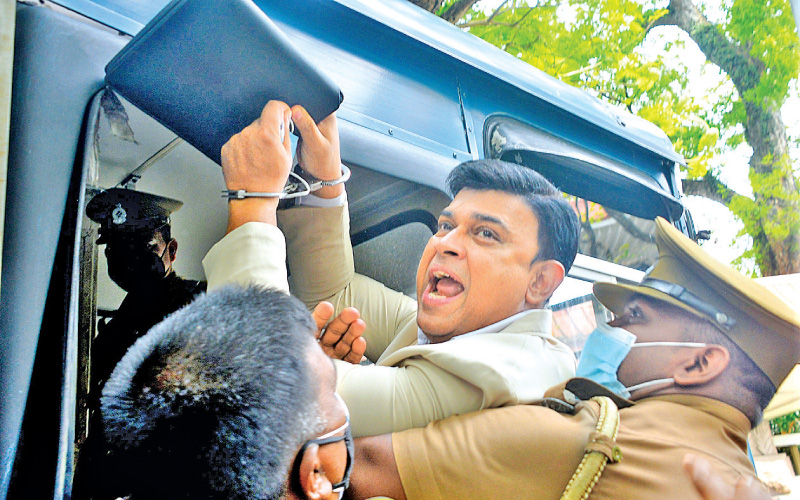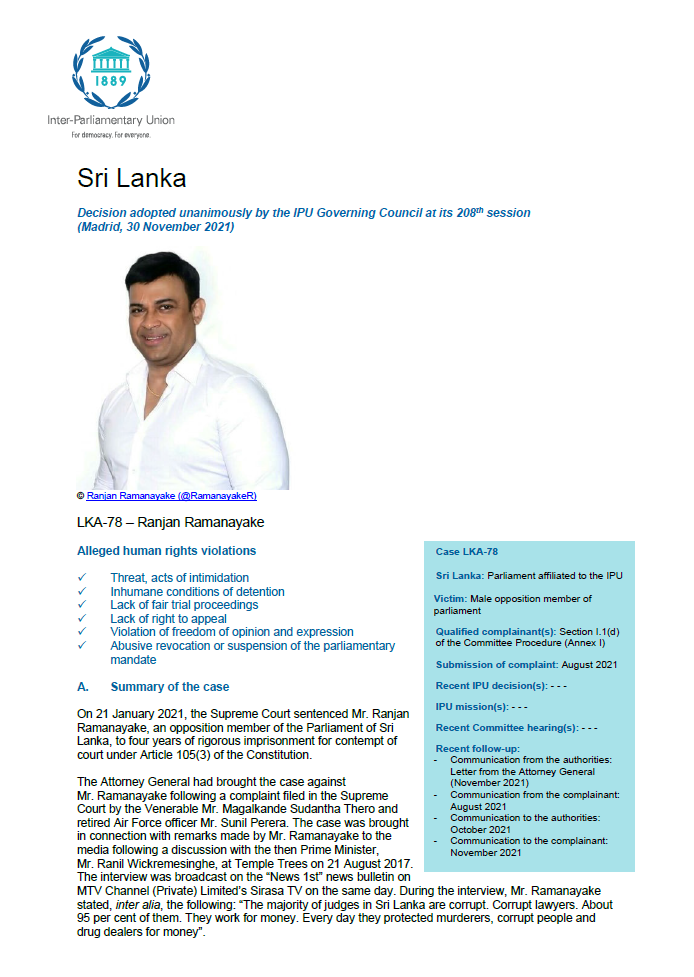Inter-Parliamentary Union has called on the President of Sri Lanka to grant Mr. Ramanayake a pardon so that he can regain his freedom and, if not resume his parliamentary mandate, at least vote and stand in elections, thereby redressing the injustice suffered by him as a result of the contempt of court proceedings. IPU has expressed the hope that the President will give its plea due consideration.
The statement by IPU follows:
The complainant states that Mr. Ramanayake’s prison sentence comes in response to his strong opposition to the Government and his efforts to denounce and root out corruption. The complainant considers that Mr. Ramanayake’s sentencing and conviction run counter to his right to freedom of expression, all the more so considering that ample information is available to show the level of corruption in the judiciary, and to his right to participate in the conduct of public affairs, given that his parliamentary mandate was terminated as a result on 7 April 2021. Moreover, the complainant, as well as the United Nations (UN) Special Rapporteur on the independence of judges and lawyers, state that in the Sri Lankan legal system “contempt of court ” has not been defined clearly, and that the verdict cannot be appealed. Moreover, as a consequence of the sentence, pursuant to Article 89(d) of the Constitution, Mr. Ramanayake will be barred from voting and standing in elections for a period of seven years following completion of his sentence.
The complainant is concerned about Mr. Ramanayake’s state of health and prison conditions. It states that Mr. Ramanayake was only given a bed in the prison hospital where he was admitted in October 2021 because of his diabetes, hypertension, knee pain and backache. However, the prison officers, rather than the doctors, could decide at any point to send him back to prison. According to the complainant, when he is in prison, Mr. Ramanayake is only allowed to receive visitors once a month for 15 minutes. He is reportedly not allowed to make any phone calls and can only post letters, which are often sent with a significant delay.
B. Decision
The Governing Council of the Inter-Parliamentary Union,
1. Notes that the complaint concerning Mr. Ranjan Ramanayake is admissible, considering that the complaint: (i) was submitted in due form by a qualified complainant under Section I.1.(d) of the Procedure for the examination and treatment of complaints (Annex I of the Revised Rules and Practices of the Committee on the Human Rights of Parliamentarians); (ii) concerns an incumbent member of parliament at the time of the initial allegations; and (iii) concerns allegations of threats and acts of intimidation, inhumane conditions of detention, lack of fair trial proceedings, lack of the right to appeal, violation of freedom of opinion and expression, and the abusive revocation of the parliamentary mandate, which are allegations that fall within the Committee’s mandate;
2. Is alarmed that Mr. Ramanayake is currently serving a four-year prison term owing to a highly questionable verdict and sentence, neither of which, in violation of basic fair trial standards, is open to judicial review, as the Supreme Court ruled at single instance;
3. Considers that, in making the statement, Mr. Ramanayake was exercising his right to freedom of speech and his parliamentary mandate, which includes oversight of the overall state of administration of justice; considers also in this regard that both common law jurisprudence and human rights doctrine amply demonstrate that freedom of speech must be the overriding value where contempt of court is concerned; and considers, therefore, that the prison sentence is totally inappropriate and that, should any sanction have been considered necessary, this should have been limited to a warning or a small fine at the most;
4. Is deeply concerned that, as a result of the sentence and conviction, Mr. Ramanayake’s parliamentary mandate was terminated and that, in addition, he will be prevented from voting and standing in elections for seven years after serving his sentence;
5. Calls on the President of Sri Lanka, therefore, to grant Mr. Ramanayake a pardon so that he can regain his freedom and, if not resume his parliamentary mandate, at least vote and stand in elections, thereby redressing the injustice suffered by him as a result of the contempt of court proceedings; and expresses the hope that the President will give its plea due consideration;
6. Firmly believes that every parliament has a particular interest in ensuring that its members, irrespective of party affiliation, can freely express themselves without fear of reprisal by the other state branches, as otherwise the very independence of the institution would be at stake; calls on the Sri Lankan Parliament to take this matter into serious consideration by ensuring that legislation is in place that clearly defines contempt of court, establishes clear sanctions for the most serious of cases in which there is a real and imminent danger concerning the administration of justice, and offers persons convicted an opportunity to appeal; and would appreciate receiving observations on this point;
7. Is deeply concerned about Mr. Ramanayake’s alleged state of health and prison conditions; urges the competent authorities, for as long as he remains imprisoned, to ensure that he receives the necessary medical care and is allowed to communicate regularly, through telephone calls and visits, with his lawyer and family members; and wishes to receive specific information on this point;
8. Requests the Secretary General to convey this decision to the President of Sri Lanka, the
parliamentary authorities and prison authorities, the complainant and any third party likely to be in a position to supply relevant information;
9. Requests the Committee to continue examining this case and report to it in due course.

